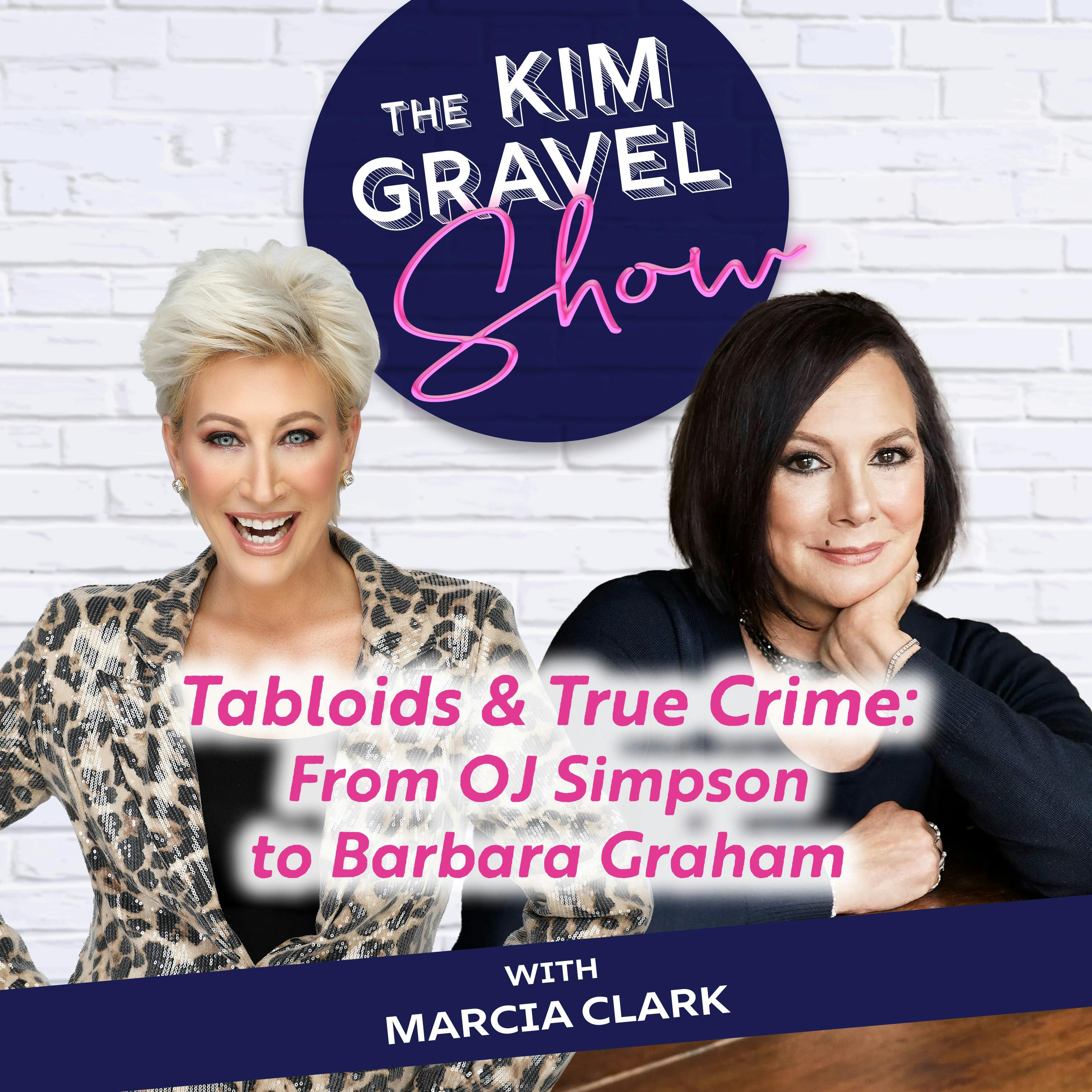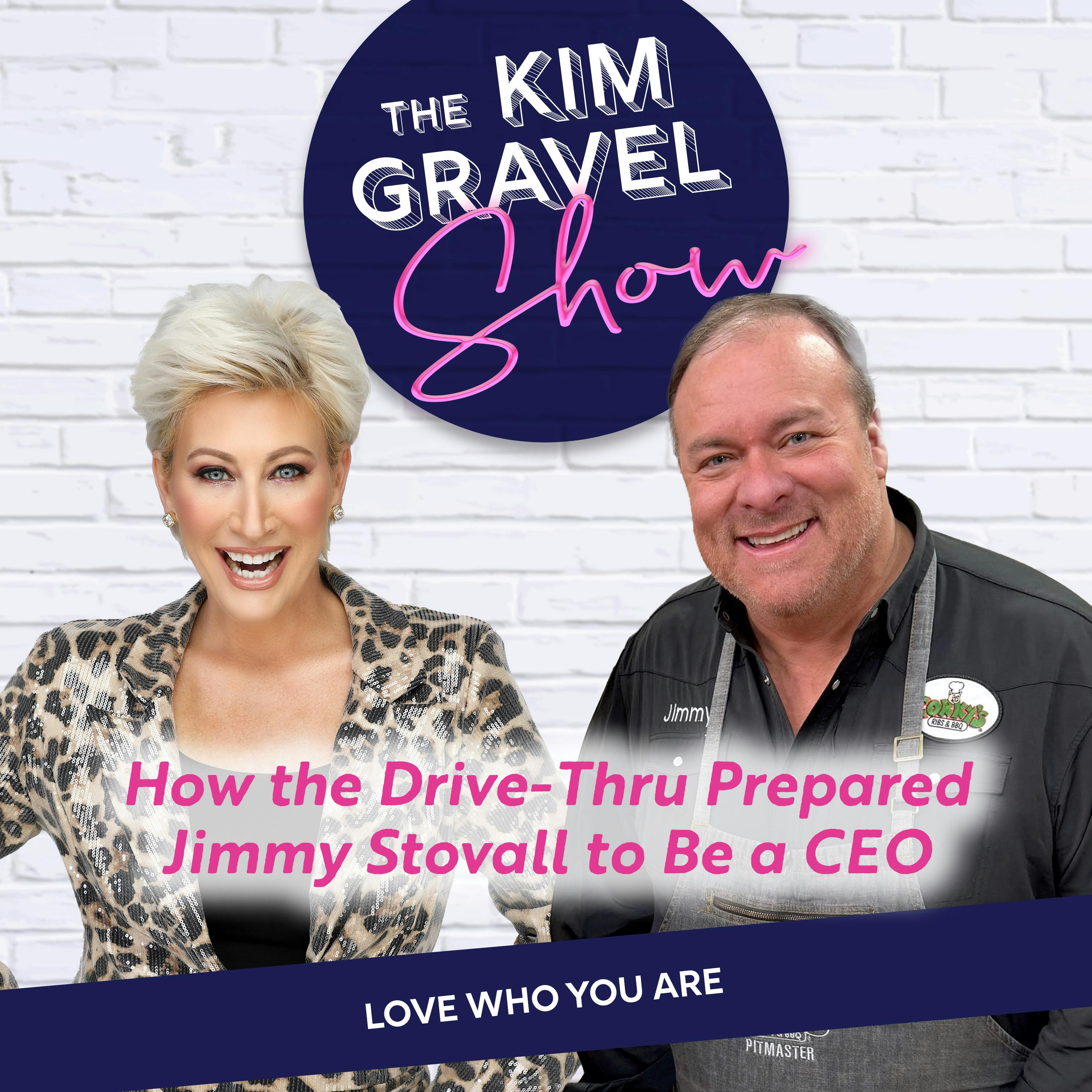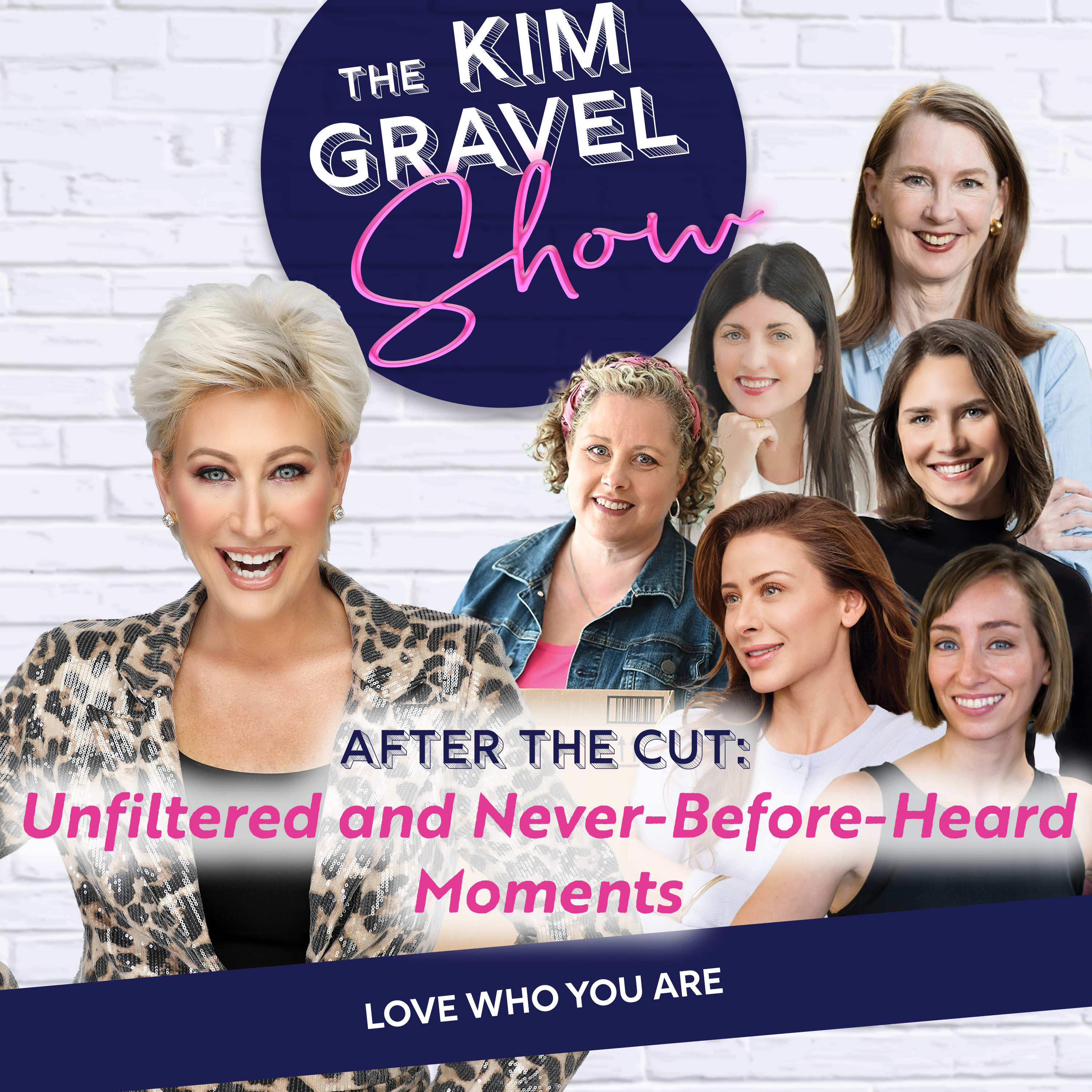Tabloids & True Crime: From OJ Simpson to Barbara Graham with Marcia Clark

True crime fans won’t want to miss Marcia Clark’s firsthand account of surviving the pressure and media frenzy of the O.J. Simpson trial.
Imagine being flung into the public eye and suddenly every newspaper in the country is scrutinizing every move you make for months? My guest this week lived it. This week Marcia Clark, the powerhouse prosecutor from the O.J. Simpson case, is on the show to tell me what it's like to prosecute the trial of the century, how the media effects justice, and why she chose to write a book about the case of Barbara Graham. Marcia shares her journey from prosecutor to bestselling author, offering unique insights into the world of true crime. We dive into her experiences with the media frenzy during the O.J. trial, and we dissect the incredible true crime case from her new book, Trial By Ambush. If you love true crime, you can't miss this episode!
In this episode:
- How Marcia landed the O.J. Simpson case
- How Marcia maintained composure under public scrutiny during the O.J. trial
- Insights into high-profile cases, judicial practices, and the media's impact on convictions
- How Marcia transitioned to becoming an author
- The real story behind Marcia's new true crime book, Trial by Ambush
Marcia Clark is a bestselling author of nine legal thrillers and one memoir. Her books include the Rachel Knight series (The Competition, Killer Ambition, Guilt by Degrees, Guilt by Association), optioned by TNT for a pilot starring Julia Stiles. Her latest series follows criminal defense attorney Samantha Brinkman (Blood Defense, Moral Defense, Snap Judgment, Final Judgment), and her recent standalone thriller, The Fall Girl, was released in September 2022. A criminal lawyer since 1979, Marcia was a prosecutor in high-profile cases like the O.J. Simpson trial and the conviction of Robert Bardo. Her 1997 memoir Without a Doubt became a #1 New York Times bestseller and was re-released in 2016.
Here is my favorite quote from this episode:
"It all goes to the human condition and the state of mind of people and the lengths to which they'll go for a variety of reasons. And I think those things are fascinating to us." - Marcia Clark
Have you tried my exclusive holiday candy yet?
Kimmie's Candies Sea Salt Caramels are the perfect gift that’s both indulgent and guilt-free. Rich, chocolatey caramel with a touch of sea salt—zero sugar, keto-friendly, and gluten-free. A delicious, guilt-free indulgence for anyone on your list!
Order 3 boxes with free shipping now at kimgravelshow.com/candy.
We have a very limited supply so get yours before they sell out.
Do you want to hear your voice on the show?
Call me and leave me a voicemail at 404-913-6460 and let me know why you love who you are!
There is BONUS CONTENT in our free newsletter so make sure to subscribe at https://www.kimgravelshow.com
Collecting Confidence, my best-selling book is now available in paperback with a brand new discussion guide!
Click this link to buy it now.
Join my Love Who You Are movement at https://lwya.com
Connect with Me:
Connect with Marcia Clark:
Book: Trial by Ambush: Murder, Injustice, and the Truth about the Case of Barbara Graham
New episodes of The Kim Gravel Show drop every Wednesday at 6pm EST.
Support our show by supporting our Sponsors:
Factor
Stay energized with America’s #1 Ready-to-Eat Meal Delivery. Factor offers six menu preferences to help you manage calories, boost protein, avoid meat, or eat balanced. Chef-prepared and dietitian-approved, Factor meals taste great and support your goals.
Visit https://www.factormeals.com/50kim and use code 50KIM to get 50% off your first box plus free shipping for as long as your subscription is active.
*This transcript was auto-generated*
Kim:
Hello and welcome to the Kim Gravel show, y'all. I have the most incredible guest today and we're going to get down and dirty into true crime. I absolutely love all the true crime shows and today's guest is an expert when it comes to true crime. But first, have y'all heard that we have our own Kim Gravel show exclusive. Zero sugar chocolate salted caramels, y'all. It is the perfect guilt free treat for yourself and it makes a great gift. First things first, they are delicious. I when I tell you all the other candy is dead to me.
Kim:
I am only eating Kimmie's candies from now on because they are so yummy and they're big. The portions are so big. But they're also the perfect treat because there's absolutely no sugar. They're keto gluten free, no dyes, no nuts, and it's only 20 calories a piece and less than 1.5 carbs per piece. And you know, I have been on my weight loss journey and I put on ten pounds. But y'all, I can eat candy now while I'm taking the ten pounds off because these are truly so good and the portion is great. Just head over to kimgravelshow.com candy that's kimgravelshow.com candy. I'm selling it in three packages, three boxes with free shipping.
Kim:
So you can keep one and give the other two as Christmas gifts. Or if you're like me, just keep all three and enjoy. Thank you to Zollie Candy for partnering with us to make this happen. They are so good and yummy and I know you're gonna enjoy them. Okay, Zac, let's get on with the show.
Marcia Clark:
This is the cummerbund show. You wanna handle it? You know. And then he said, well, first of all, it's O.J. simpson.
Kim:
What was that like, girl? Was it what we saw on tv?
Marcia Clark:
It was much worse. There was so much press at the crime scene at the same time, I thought they'll go away. During the end of the trial, came to realize we had it all wrong. The jury didn't know things that I talk about in the book. I found things that nobody has written about ever.
Kim:
If you could go back in time, would you turn down the O.J. case? Okay, everyone watching and listening to this knows my guest today because she was the lead Prosecutor on the O.J. simpson trial. I am so flippin excited. Okay, now she is a New York Times number one bestselling author of over 13 books, including the popular Samantha Brinkman and Rachel Knight series and she wrote a true crime book called this is a brand new book, Trial by Ambush, Murder, Injustice and the Truth about the Case of Barbara Graham. Y'all less welcome Marcia Clark. Ok Marcia. Y'all, Marcia Clark is on the flippin shows.
Marcia Clark:
That was a wonderful intro. The best I've ever had.
Kim:
Thank you.
Marcia Clark:
That was fantastic.
Kim:
We spare no expense, Marcia. We spare no expense.
Zac:
We're the best she's ever had.
Kim:
Best she's ever had.
Zac:
You know what, it's all downhill from here. Let's just.
Kim:
Good interview.
Zac:
Great episode everybody. See you later.
Kim:
Bye bye. See ya. Marcia, I'm sorry but you're just going to have to just let me fangirl for a second because woman you have been through, you are probably one of the most strongest women on the planet. I mean, can we just talk about. Because O.J. simpson just passed this year, wasn't it this year. And you were probably the most. I think you were actually more reported on than he was during the trial, would you say? Or at least neck and neck, right?
Marcia Clark:
Well, he didn't say as much so there wasn't as much to focus on. He was quieter.
Kim:
So Marcia, what was that like before we get into the book? Because I think that's why you're such a perfect person to be a true crime author, because of what you've been through. But what was that like, girl? I mean, was it what we saw on tv?
Marcia Clark:
It was much worse. It was a non stop constant pressure that was just choke you out kind of tough. It was really funny. Somebody was asking me about this the other day and I had this memory of. I got, you know, you get you. It's amazing what you can get used to. You know, you kind of don't recognize what you're living through when you're living through it.
Kim:
Right.
Marcia Clark:
And the trial had been going on for a few months by then. And you know, a nine month trial is a nine month trial. It was crazy. So a friend of mine, defense attorney I'd known for years, came into the courtroom on some other business and he went over to me, he said, my God, it's a pressure cooker in here. How do you stand it? And you know, I turned around and I realized the courtroom is packed. The first few rows are all reporters, they're all trained like this. And then you know that there's like a camera in the wall that's looking down on everything that's going on nonstop. You know, I mean it was crazy.
Marcia Clark:
It was that crazy. But I forgot cause I'm in the middle of it all the time. And sometimes that was a problem I had that I forgot that people were watching. So it was, you know, he kind of snapped my head around and I realized, you know, it is kind of horrible. And so it was everything you saw and then it was then some, you know, it was worse because you're in the middle of it and then every night and all night and all weekend and, you know, it just never stopped for a long, long time.
Kim:
Yeah. Because you, you became part of the story. I mean, you really did as a woman, as a female prosec. Because I, of course, I've watched everything on you. All the Lifetime movies, all the movies that have been out, all the stories, all the behind the scenes, and you really, you had to deal with like a little bit of misogyny and in proving yourself in your department. How did you get the case, girl? How did you get the oat Was. It was your time? Did you pull the lucky, you know, straw? What happened?
Marcia Clark:
Well, what's really funny to me, and I didn't realize the rest of the world didn't know this until Simpson. A lot of female prosecutors were in the office and they were handling big time cases.
Kim:
Oh, okay. I didn't know.
Marcia Clark:
Yeah, no. So it was like shocking to me that it was shocking to everybody else.
Kim:
Oh, okay.
Marcia Clark:
Like, well, so what? And how I got the case was kind of a standard thing. I had worked on a nobody homicide with Phil Van Adder, who was the lead prosecutor in the case. And we had a good time doing it. It was a crazy wild case, as those kind will be. And it. And we got a conviction. And then he called me up one morning and he said, I got this case you wouldn't believe. I'm working on a search warrant.
Marcia Clark:
You want to handle it? And I said, well, tell me the facts, you know. And then he said, well, first of all, it's O.J. simpson. And I said, well, I vaguely remembered who he was.
Marcia Clark:
I really didn't know.
Marcia Clark:
Ryan Murphy had a really good time with that. It was one of his bylines. And he said, she didn't know who he was. She does now. So I had vague memories of Hertz commercial and Naked Gun. And I knew he was an athlete, couldn't remember the sport. And, you know, I was not a sports fan, so that's, you know, sorry.
Marcia Clark:
And it was no big deal to me. It was just a. What are the facts? So what do you have? You know, I don't really care who this is. And then he Started telling me all the evidence that they had. And I said, my God, it's ready for filing. This is a ton of evidence. And just circumstantial evidence alone was incredible even before the DNA came in. And it's kind of typical, though, of a rage killing where they just go crazy and they leave all kinds of evidence behind.
Marcia Clark:
I've seen this before, typical in domestic violence cases. So, you know, I helped him over the phone, you know, with the search warrant, said, you know, ask for this, look for that, blah, blah, blah. And I said, it looks like it's pretty good. You're not. I think it's fileable. And my boss said, okay, run with it. It was really that simple?
Kim:
That's simple. Yeah. But you had no idea. You really had no idea what, None. What was going to unfold?
Marcia Clark:
No, no, not a clue.
Zac:
What was the thing that was like, oh my gosh, this is a big deal.
Kim:
Yeah.
Marcia Clark:
So let me, let me just back up like a few years. Back up a few years. So a high profile case. I'd handle a few. One of them was the murder of the actress Rebecca Schaeffer and my sister Sam by the stalker.
Kim:
Oh, I remember that one.
Marcia Clark:
Right. And so it's typical that when you have a high profile case, the press would come in at the time of the arraignment, take a few photographs. Never of me. Maybe. Maybe mention my name. Probably not. And even if they did, wouldn't spell it right. And then they'd go away and then they'd maybe come back in time for the verdict.
Marcia Clark:
Maybe not. Depending on what else was going on in the world. That was a high profile case. That then the notion of a 247 news cycle where they would have cameras in the courtroom non stop, like a reality TV show. Oh, yeah. No, no way. The only experience I had with that was Court TV was starting to come into the courtrooms.
Kim:
Right.
Marcia Clark:
But they had no licensing, they had no carriage anywhere in this in. I mean, it was like a few households here, a few households there, maybe total in the country. 150 people might have seen me, maybe. So there was just no experience like that whatsoever. I started to get a hint it was going to be weird in this case when I was out at Rockingham and as I was leaving, I saw the press was just packed around. The Bronco was cordoned off, but not enough. Somebody got to put their coffee cup on the hood. I thought, this is not good.
Marcia Clark:
But I thought, yeah, okay, the press is here. I didn't like it. You know, it Worried me that there was so much press already and at the crime scene at the same time, I thought, they'll go away. Oh, Lord, don't ask me for any predictions about anything, you know, because, yeah, I'm not, not, not a strength. And then it really did get crazy. And I think it was by the time we did the arraignment. And I remember that when Simpson first said, tried to choke out his plea of not guilty, he couldn't do it. And he kind of folded on himself.
Marcia Clark:
And Shapiro, his lawyer at the time, said, can we redo that? And I'm like, what are you, what.
Kim:
Do over redo courtroom. Do Hollywood right.
Marcia Clark:
Take two. Oh, okay. And then the judge let him, oh, boy, this is not good. And then I, you know, and then it was by the time we filed the case, that was, that was the final dropping the hammer. When I realized, okay, this is going to be different, I rode down the elevator with our press person. And as I walked out, so the lobby of the criminal courts building is vast. It's ginormous. There are metal detectors and all the rest of it, it can pack hundreds.
Marcia Clark:
And then there was an upper tier that looked over. There was a second level and a balcony, that interior balcony that looked over that lobby. And it was never did I see anybody in that second tier. And it was packed. And the reporters were packed. Not only had packed not only the lobby, but the upper tier as well. They were hanging over the balcony and, like, on top of each other and like, zooming in. And it was one of those moments where I thought, oh, this is going to be something different.
Marcia Clark:
This is going to be something different, and it's not a good thing.
Kim:
Did we see all of the evidence? Did we see what really went down? Because I'm assuming you thought he was guilty from the jump.
Marcia Clark:
Right, or I wouldn't have filed it.
Kim:
Right, right.
Marcia Clark:
You don't file a case unless you firmly believe, not just beyond a reasonable doubt, but all doubt, that he's guilty. Otherwise, you don't go to court.
Kim:
So how did he get off? How did that happen, Marcia?
Marcia Clark:
Well, the reasons are so numerous, we could sit here for hours and talk about it. No high profile case exists in a vacuum. When a case becomes something that gains national attention, all the swirling things that are happening in society at the time, all of our cultural biases and all of the most recent experiences in the criminal justice system get brought to bear. And we were trying this lawsuit in the wake of the Rodney King riots.
Kim:
Right.
Marcia Clark:
The most violent riots of that century. And that had just happened a year and a half or so before that. The officers were acquitted of the beating of Rodney King. And the riots that ensued were, you know, of national attention. That was very destructive. Setting. That was the setting. And during the selection, during jury selection, I thought, you know what? There's an elephant in the room.
Marcia Clark:
I had better talk about this. So I said, look, I want you guys to know our office was prosecuting those officers. We thought they were guilty. They got off. We don't agree with the verdict, but it's not going to help if you go into this case thinking it's payback time. No, two wrongs do not make it right.
Kim:
So you saw the payback coming from the jump from jewelry selection. Oh, my gosh.
Marcia Clark:
And it was later reported that immediately after that, they went to lunch and one of the jurors said, oh, yes, it is. It's payback time.
Kim:
Well, I. I've seen some of the jurors say that they said not guilty based on race and based on the Rodney King situation. I mean, jury members have admitted it.
Marcia Clark:
Yeah, they had that. Now they have. Now they have. Yeah, but then they didn't. I get it, you know. You get it. I mean, it's not. You don't have to agree with it to understand it.
Kim:
Right.
Marcia Clark:
And I think also had. I don't want to get into it, you know, saying, we'll get into dissecting if this hadn't happened. If that hadn't happened.
Kim:
Right.
Marcia Clark:
And at the end of the day, what happened happen, you know.
Kim:
Yeah, but, you know, you said, you said there was. There was no privacy for you. You were famous in a way that was kind of terrifying that you had no protection. Reporters showed up at your house. You know, there wasn't even a sidewalk. They literally parked on your front lawn. What was that like? Like, how did you manage to keep composure and keep your job? First and foremost during that time?
Marcia Clark:
It was upsetting, but the only way to handle it was not to think about it.
Kim:
Okay.
Marcia Clark:
I mean, that was really the only way. What am I going to do? I can't change it. The street I was living on had no sidewalks. So when people parked in front of my house, they were parking five feet from the front door. Couldn't change that. So I just had to kind of, you know, you just kind of focus on what's happening, what's going on. And in a way, walking into court was like the best thing, because then that's all that existed for me. You know, you walk into court and that's what you're doing, that's all you're doing.
Marcia Clark:
It's all you can do.
Kim:
When did you realize the media was going to turn against you in the way many of them did?
Marcia Clark:
I didn't, I didn't think about the media and how they were turning, you know, I mean, why, how could I? And that wasn't my job to worry about that. I had to worry about a case, a lawsuit, you know, and that was all I focused on. And what the press did. The press did, you know, just before.
Kim:
We move on to the book, because it's a perfect segue. When O.J. passed, did you ever talk to any of him, his family members, any of the victims family since the trial?
Marcia Clark:
Yeah, I mean, of course I was in touch with all of them at one point or another for a while after the trial and more recently with Kim Goldman. And I really. And I ran into Simpson sister in Las Vegas when I was covering the Las Vegas case for Entertainment Tonight. And it was very cordial, you know, it was. Yeah, I know. Entertainment Tonight.
Kim:
Isn't that funny?
Marcia Clark:
It was funny, but she, you know, we was very nice. How are you? How are you? It's kind of like, you know, we all went through something together, but the, the families are a whole separate thing. And people had called me when he passed asking for comment, and I thought, he can't hear me now. And of course he knows how I feel. And the only thing to say, I thought was to send my condolences to the family. They don't deserve whatever I might feel about him. And, and the press went away really fast because that was not clickbait. Yeah, okay, never mind.
Marcia Clark:
You.
Kim:
But you, you were doing your job as a, as a prosecutor. Yeah, that's what your job. I absolutely love true crime. I think I'm one of the. How many millions upon millions of people that do. And Marcia, you write about it. So what, what made you leave being a prosecutor and become an author? I mean, that's a jump to me. That's like that, you know, I mean, law author, you know what I'm saying? Like, how did that happen?
Marcia Clark:
You know, And I think it's actually a more natural segue than you might think. First of all, I did always want to write a book when I was a kid. I loved, I loved cr. Fiction. I love fiction.
Kim:
I'm obsessed with it.
Marcia Clark:
Me too.
Kim:
Okay, wait a minute, wait. Before you get into. Why do you think we are? I mean, especially, I mean, women are big into this. Because I remember growing up, my grandmother sitting There watching all of the. All of the, like, true crime stuff, you know, snapped. I remember I used to watch Snap. Why are we so obsessed with it?
Marcia Clark:
It's a puzzle. It's a puzzle and. But it's a puzzle about what humans do, what people do, and especially when people go to the extreme of committing something as serious as. Then the why of it all gets us. You know, why did they do that? And then how do we prove that they did that? And then, you know, what happened to the victim? And why did the victim. Why is the victim in this position? You know, there are so many whys to it that we want to solve, because it all goes to the human condition and the state of mind of people and the lengths to which they'll go for a variety of reasons. And I think those things are fascinating to us. To me, anyway.
Kim:
To me, too. Yeah. So you wanted to write a book back when you were younger. So how did this. Yeah. So I'm sure you got a lot of book offers and book deals after the trial.
Marcia Clark:
I did, and that's why I wrote Without a Doubt. It was funny. I didn't really want to write about the trial, to be honest. At the same time, I thought, I do want to write about the trial. I want people to know what really happened. I want them to know the truth about our side of the case and what went on. There was a lot of misreporting. There was a lot of distortion and deliberate.
Marcia Clark:
And not deliberate. So I thought, I better do this.
Kim:
They said you had an affair with. Didn't. I mean, they really. Your hair. They talked about your hair. They talked about everything. They posted pictures about you inappropriately in a magazine. Like, girl.
Kim:
I mean, seriously, you were a star.
Marcia Clark:
Yeah. Not an unwilling star. And I have to say that, I guess, is part of the reason I had a little bit of a moment of identification with Barbara Graham. It was the same thing, you know, and it seems that when a woman is in. Anywhere involved in a murder case, that the press goes like it's like a homing pigeon right in there. And they zero in, you know, and they did on her, too. So she. There's this woman.
Marcia Clark:
She's young, she's 30 years old. She's beautiful. And she's charged with this heinous crime, a murder of a very innocent elderly woman who lives in this quiet little suburban place, Burbank, you know, and it's a vicious, really vicious murder. And she's sitting next to these two thugs that look like the one thing here is not like the other.
Kim:
Right.
Marcia Clark:
And the press went nuts with this. The press nonstop focused on her hair, her makeup, her clothes, every move she made, every time she yawned, every time she turned her head. And it was, and in large part, such a distortion and exaggeration of anything she did. Because they were just looking for something to write about, because everybody. That's what they were interested in. And it was like their version of clickbait. And they wrote about her morning, noon, and night. In every edition of the press, it came out something about Barbara, the way she looked, by way of contrast, the two men sitting next to her.
Marcia Clark:
It was so hard researching for this book, to find even one line describing the men. And, you know, they're. They were the masterminds. But she got stood up as being the leader of the gang, which was completely wrong. It was an amazing thing.
Kim:
Yeah. I want you to be my true crime narrator today. Take me through this murder from the beginning, because I want to look really deep into it. So, like, what happened to Barbara on the night of March 9th?
Marcia Clark:
So Barbara was someone who was abandoned and neglected from birth. Her mother really didn't want her. And although she wound up having two more kids, so you. She kept them at home. So it's not just a matter of not wanting kids. She didn't want Barbara, her firstborn. Barbara never knew her father. She wound up, of course, getting into trouble.
Marcia Clark:
They were impoverished, and she got shunted off to live with strangers many times and wound up, at one point, shunted off to live with a woman who was an abusive monster, as was her mother. And in the book, I talk about that kind of upbringing, lack of upbringing that she had. Nevertheless, she was smart, naturally smart. Loved jazz, loved reading, loved books. It was an amazing thing. But she never got past the eighth grade. She wound up doing what unskilled, impoverished people do, which is anything she can in order to make a living. And so shoplifting, wrote bad checks, prostitution, and yet somehow managed to stay away from the really violent stuff.
Marcia Clark:
Never, never committed a violent crime. So her involvement in this particular case was really something way out of step for her, way out of the. It's not. Not in her nature at all. This case happened because of a rumor that this man, who was a casino operator and a big entrepreneur, real estate entrepreneur from Las Vegas, had stashed a lot of money in his little house in Burbank. So on the night in question, a young, beautiful woman went to the door because they knew Babel Monahan was very security conscious. She had never really lived in a house before. Being a vaudeville trooper meant she lived in hotels.
Marcia Clark:
There was always somebody manning the front desk at hotels, so she never worried about security. But now she's living in a house that has all kinds of doors. No doorman and nobody at the front desk, just her. So she kept everything locked tight, didn't open her door for anyone. This, too, leaked out into the criminal community. And they knew that if they're going to get her to open the door, they're going to need to have somebody that she'll trust and open the door to. Barbara was that person. Her role in this whole thing was to.
Marcia Clark:
Was to go to the door, say she had her car broke down, and could she please use the phone? She played her part well. Mabel opened the door, and the men rushed in. What happened next is the facts of that and the details of that. I'll let you read that in the book. They tore the house up looking for this safe that was supposed to be there. Right. They ripped up carpeting. They moved furniture.
Marcia Clark:
They tore it up and even went through Mabel's closet and dumped out all the purses, looking for everything. Ultimately, I think the whole thing took 15 minutes, maybe 20. Then they all left. And what happened in the aftermath of that, again, you'll see in the book the next day. And it took until the next day when the gardener came, saw the door was slightly ajar, which was very unusual. She left nothing open. Mabel did never. The gardener, who was a young guy, stepped in, saw that the whole house had been turned upside down, saw blood on the walls, and backed out again.
Marcia Clark:
Whoa. Called his friend, who was a cop, who was then off duty. He showed up and looked in. He walked inside and then found Mabel in a hallway lying on the floor, and called in the troops. Lieutenant Robert Covney of Burbank Police showed up and took over. What they found was not only that the house had been torn up, but also that there was a purse still hanging in the closet with thousands of dollars in it. And all of this expensive jewelry that was left untouched, touched. So they couldn't.
Marcia Clark:
So now they don't know who did it. And they also don't know why, because why would you leave all that? As it turned out, they had no physical evidence. They never recovered any fingerprints, shoe prints, Nothing. Nothing. So they had to rely on any witness they could find. But there were no witnesses. There was a barking dog. Remember that? Dogs are telling us things we never pick up on.
Kim:
We never. Right. Listen to the dogs, people.
Marcia Clark:
We don't listen. Listen to your doggie. Yes, but but that was it. There was no eyewitness. No one had seen or heard anything. So they were at wits end. And they started pushing out to all of their informants, the people they could usually get to give them a tip here or a tip there. And it took quite some time before somebody finally got squeezed who was willing to talk.
Marcia Clark:
And that was Baxter Shorter. And Baxter Shorter laid it out and gave them their first wheel lead that led them to the defendants that wound up on trial, as well as the accomplice who turned state's evidence, as I call him, the ironically named John. True.
Kim:
So. So Barbara, wasn't she a beautiful woman, too? Barbara.
Marcia Clark:
Barbara was very beautiful. They accused her of looking. Accused her of looking more like a showgirl than a defendant. And, you know, all she was doing was getting herself tidied up for court. She really wasn't.
Kim:
I saw.
Marcia Clark:
You know, when you see the pictures of her and it's easy to find, you know, you just jump online, you can find pictures of her. Her hair was tied back in a bun. She was wearing makeup, but she was dressed and dressed in a skirt suit. Was it a fitted suit? Yes, that was the style. I mean, you know, she just. She just got herself presentable, as you would if, you know that the whole world is watching. So she did a better job than I did, so I have to say. But she got taken to task for that too.
Marcia Clark:
You know, I mean, it was really a kind of remarkable thing. And so I wasn't really sure that I was going to look at this case. I wanted a case that if I was going to write about true crime, it had to have more to it than just blood and guts and a monster hiding in the closet. You know, the serial killer stuff. I'm over it. I've done it. I've handled those cases. And I thought there really isn't much to them, oddly, because the why of a serial killer case never makes any sense.
Marcia Clark:
Why? Because he felt like it. Well, could it be more boring than that? I mean, there's just Right. There's nothing to it when it comes to the more normal crime. I hate to put it like that, but if you know what I mean.
Kim:
I do.
Marcia Clark:
For reasons that we can understand, that we can reason our way through it, then there's something more to it, and maybe there's something to plumb in terms of lessons to be learned and parallels we can draw to our own world day. And I found them. In spite of the fact I didn't think so, and I didn't think I would in part, because back in 1953, when this all went down, right, this was their trial of the century. This was their big case, and it was their O.J.
Kim:
Simpson.
Marcia Clark:
Yes, it was. Yeah. They had nationwide coverage. It was all print coverage and of course, still cameras. But it was very big news, very big news. And they had people lined up to sit as spectators in the courtroom. Every day people were lined up to pack the courtroom and pack the gallery. And so I thought.
Marcia Clark:
And then they made a. When she, after she was convicted and then put on and she was executed, they did a movie. They put out a film called I Want to Live, starring Susan Hayward. She won an Oscar for Best Actress for her role in that. You could still watch the movie if you want to. The movie is nine parts bull. But it does give you an accurate view of the end of Barbara and the death penalty, how it operated back then. That was accurate.
Marcia Clark:
And even the police agree that is exactly what happened. So they were very faithful to that part. The rest of it, not so much. That's why the book. But so that film, I figured, and it won an Oscar, I figured everybody and his dog would have written something about it. And there was nothing left for me to say. So, you know, I was very skeptical that this was going to be the case I was going to write about until I started looking into what was written about it and discovered that they hadn't. There was this really slim book written from the prosecutor's point of view by one of the reporters that gave the most tabloid slanted coverage, painting Barbara as a villainous and a seductress and, you know, stone cold hearted Bloody Babs and all that.
Marcia Clark:
And of course he collaborated with the prosecutor. Okay, well, that's not your most reliable source. And what he wrote, what he was writing about her in the newspapers every day was horrifying and clearly untrue in many parts. So I said, okay, if that's all I have to worry about, what I need to do is make sure that I have the sources to tell the truth about the case. Okay, that's not so easy because it's a 70 year old case. There's nobody left to talk to, right? There's no one around to interview. So I had to hope for archives and I had to hope for sources that people kept things, kept writings, kept documents, kept motions. Most of all, kept the reporters transcripts of the trial because that's what tells you what people actually testified to.
Marcia Clark:
Not what the press decided was exciting or how the press. But the truth of the matter. This is what the lawyers said, this is what the witnesses said, and this is what the judge did. So finding that was the big crucible, and it took months to get it, and I wasn't even sure I could. I talk about that in the book, too, in the forward, the. The journey. It was just amassing everything. But one of the big gifts I finally did, the state archives came through.
Marcia Clark:
They were wonderful. The day they delivered that box, I still wasn't sure what it was. They didn't know what they had either. And if I thought, if this is not the reporter's transcripts, I'm toast. It's already over. So when I opened the box, I kind of, like, closed my eyes, held my breath, and said, oh, God, this is it.
Kim:
This is it.
Marcia Clark:
Opened the box, and I looked down and it said, volume one reporter's transcript. Yes. Yes, this is it. Then I realized it was over 4, 000 pages of reporters.
Kim:
Because I'm sitting here thinking about other trials, like major trials, like the Casey Anthony trial and the Mendez brothers, you know, I mean, Menendez. Yeah, Menendez. Like, tell me, like, what are your thoughts about.
Zac:
Wait, let me. Let me play this clip from the book, actually, kid, because I actually, I pulled a clip where Marcia mentions Casey Anthony. So let me play this clip to set this up.
Marcia Clark:
The reporters had their knives out, and they were going to find a reason to write about the ice water running through her veins. No matter what she did, if she'd openly wept, they would have accused her of faking it. And that reality aside, Barbara probably wouldn't have taken the advice. She didn't need to be told that a scrubbed face and demure expression was the look that was expected more demanded of her. It was the 50s. Everyone knew how a woman was supposed to act. Not that things have changed all that much today. For anyone who doubts it, I have two words.
Marcia Clark:
Casey Anthony. And what helped enormously was the fact that Casey Anthony, who was acquitted in the 2008 murder of her little daughter Kaylee, despite damning evidence, knew how to play the game.
Kim:
Yeah, like, so how does that, Marsha, how does that. This media group think. I mean, you're the perfect person to talk about the problem around that, but how does that affect a jury? How does that affect, you know, a conviction? I mean, because what do you think about the Casey Anthony?
Marcia Clark:
Well, let me just say the press obviously did not have much impact on the jury in the Casey Anthony case, because the press was writing, they convicted her. Yeah, you bet they really did. And rightfully so. I have to say, in my opinion, I actually wound up delving much more deeply into that case when I was doing the show for AE called Most Notorious First 48, Investigating, Reinvestigating these very notorious cases. And in the process of looking into the Casey Anthony case, uncovered much more evidence, thanks to some web sleuths that were wonderful people. They really, they found computer searches and yeah, more evidence that the prosecution didn't have. When I talked to Jeff, who handled the case for the prosecution, great lawyer, and you know, it just happened that they're experts missed it and it was damning, damning evidence against Casey Anthony. As you can see if you.
Marcia Clark:
I think they probably have that show somewhere. I feel like once you stream something, it exists forever somewhere.
Kim:
It does.
Zac:
That's how it works.
Marcia Clark:
But in her case, the jury went off on the child abuse claims and I think they got all fetoozled with this notion that, you know, daddy abused her and there was really no evidence other than the story to back it up. Yet on the other hand, the evidence of her guilt was, became more and more overwhelming the more you looked at the case. But the deeper you look, the more you find. So in that case, the jury was pretty much not affected by the press. And sometimes I think the jury really can avoid all of the coverage. And they're always ordered to. Just so you know, the judge always, always instructs the jury, do not read, do not listen, do not look to add anything. To what degree the jury can actually avoid it all is the question I wrote about in the book.
Marcia Clark:
The fact that back then and even during the Simpson case, this was true. Newspapers, the news outlets would put these glass boxes on the street. You drop in a coin, you lift up the lid, you pull out the paper, but you can see the headline without buying the paper. And they do it that way on purpose so that you're enticed to drop the coin in, lift up the lid, pull out the paper, and you have these blasting headlines, you know, and whatever the news of the day, of the moment was, they could just walk past and see what the press was saying. And it just so happened that they had a bunch of them on the street lining the Call of Justice where the courthouse was, where Barbara was being tried. So as those jurors came to court and left court, they couldn't. They were walking right by these things. How they could avoid seeing them, I don't think they could.
Marcia Clark:
And one of the headlines actually showed how Santo and Perkins are two co defendants, those two thugs, they were mass murderers. And during the trial, it came out that they were being looked at for multiple murders up north. That was in one of those headlines. And the jury's walking right by it and seeing this during trial and she's sitting next to who, Jack Santos. So it's really, you know, how much they could avoid it is really hard to know. And in her case, the fact that they were able to convict and. But there's other factors the jury didn't know. Things that I talk about in the book, I found things that nobody has written about ever.
Marcia Clark:
The original statement of John True, that was taken by the police and by the DA's office up in San Francisco that they hid, Never gave to the defense. Jury never saw it. It was inconsistent in some very interesting ways. And it certainly gave you a different view of John True. There's. There's a bunch of things in play here that you got to know. First of all, it's a high profile case. You don't want to fail in a high profile case because that hurts.
Kim:
Okay.
Marcia Clark:
The other.
Kim:
You mean from, and from. What do you mean fail? Like get, not get a conviction or not?
Marcia Clark:
Yeah, yeah, yeah.
Kim:
Okay. Because what is that? When that happens, what, what happens to.
Marcia Clark:
Nothing happens to them per se. Is it an ego?
Kim:
Is it an ego thing?
Marcia Clark:
Yeah, it's an ego thing. And when it's a big case like this, it's a really, you know, it definitely besmirches your name in the office, you know, reputation.
Zac:
Does it affect your career? Does it really, like, does it truly, like people's careers are broken because they lose cases?
Marcia Clark:
I think they do. I mean, in other words, if J. Miller Levy had lost this case, and by the way, I want to make it clear, J. Miller Levy was an icon of ours. We all, like, cited Jay Miller Levy. He was the star of the DA's office and he really was very famous in his time and continued to be even when I was in the office. And we would always joke, you know, with, we lost a case, J. Miller Levy could have won it, you know.
Kim:
Okay, okay. So he, the prosecutor was.
Marcia Clark:
Okay, yeah, he was very famous. So. So, you know, that, that reputation definitely takes a hit. But do you get demoted? Not necessarily. There's always reasons why a jury quits, and it's not necessarily because you dropped the ball. I mean, if you did, that's a different story. But, you know, that's not necessarily true. But ego, for sure, that's true.
Marcia Clark:
And the pressure for the victim's family. You know, I wrote about this in the book. All the pressures that are brought to bear, that can make. That can tempt prosecutors to step over the line. And in his case, did, did And. And it's one thing to go. There was also, of course, a mentality at that time where there's kind of a cowboy mentality about get them, you know, get them at all costs. Get the notch in the belt and you push the envelope and as far past it as you can get away with.
Marcia Clark:
I don't think that's the mentality in today's world for most prosecutors. That said, it probably is still for some, and we've seen it more recently in some cases. And then the case of Nora Jackson down in Tennessee is one example. She was accused of kill mother. And the prosecutor not only failed to turn over exculpatory evidence that really cast into doubt some key testimony, but also during closing argument violated the cardinal rule that you're not allowed to comment on a defendant's invocation of his Fifth Amendment right to remain silent. You cannot use that against him and say, well, if he was. If he was innocent, he would have talked.
Kim:
He would talk.
Marcia Clark:
Yeah, you can't do that. And she did it and turned to Nora Jackson in the course of the closing. Closing argument and said, nora, why won't you tell us where you were? Why won't you tell us? I mean, it was like, ridiculous. No. Who does that? They still do that. Back in J. Miller Levy's day, to his credit, he did that a lot. But they were allowed to back then.
Marcia Clark:
It was before the case came down, called Griffin vs. California. Before that case came down. The comment rule, as they call it, allowed prosecutors to comment on somebody's invocation of their fifth Amendment right, the right to remain silent, even though the day was coming. And they knew it, too, the day was coming when that was going to change because the federal courts did not allow it. And the federal courts had stopped allowing that kind of comment back in 1893. So this was going to change for sure. And I think other states had changed it.
Marcia Clark:
In California, not quite yet, but. Right. Not long after that, it did change. And that became a rule that. That. That's grounds for a mistrial. That's the end of your case right there. But he did it a lot.
Marcia Clark:
He went after her, but he went after her way in ways that were so beyond the pale because she was the get. It's easy to convict someone who looks like Jack Santos and Perkins. They look like what they are. Right, right. Easy to get them, but get her. She doesn't look like that.
Kim:
It Was almost like, it's almost like a theater, a movie, you know, it tells a better story, right?
Marcia Clark:
Yeah, yeah. Yes.
Kim:
Wow.
Marcia Clark:
But it also.
Kim:
How much of this, how much of these prosecutors are. Do you have to act? Do you have to perform? I mean, you know, you've got to state facts, but you've been in the most high profile case probably of our century, to be quite honest with you. How much of that is, you know, performance or how much does that help you?
Marcia Clark:
I should say, well, you know, performance is one thing, but you can go overboard with that sort of thing.
Kim:
Yeah.
Marcia Clark:
And you gotta be really careful to crawl to toe that line where you don't lose credibility by being this big. Da, da, da, da, da, da. You know, Now a jury who is inclined to convict or inclined to acquit is gonna forgive you all that stuff because it's window dressing anyway. Who cares if you, you know, you too showy. But in the normal case where, you know, they're really there to listen to the facts and apply the law and they want to know what the truth is and come to the right decision, they're not going to dig somebody who's doing a lot of screaming and yelling and spitting in the air and, you know, waving their arms.
Kim:
OJ's attorneys did that, in my opinion. They were very performative.
Marcia Clark:
Some of them did. Some of them did.
Zac:
And in the ordinary cases, he was so. He got so famous like for being the guy that could get anyone off. Right. Wasn't that like.
Kim:
Yeah, Johnny.
Zac:
Yeah, Johnny Cochran..
Marcia Clark:
Well, Johnny already had a good reputation when he came into the case. He was already very well known. He always tried the same, it was always the same tactic. It was always race, always playing the race cards.
Kim:
He did it quite well.
Marcia Clark:
Yeah, he did it very well. And there was reason, there was reason for it. There was reason not in terms of the case itself, but in society writ large. And so he appealed to jurors on that basis. Now, you know, it doesn't play for all jurors. It didn't play for all the people in the public. It played to those jurors and we understand why, but it doesn't necessarily always work. But he was not, he was charming, but I never got the impression that he went over the top in terms of the wild man kind of performance, razzle dazzle, you know what I mean? He wasn't that, he was cool.
Marcia Clark:
The person I thought that went way over the top and probably would have turned off Jurors in any other case was Barry Scheck. That kind of screaming and hollering and gesticulating, and, I mean, no judge would allow it. I don't know why Judge Ito let things happen in that courtroom that no judge.
Kim:
Well, I think he drank the Kool Aid a little bit. He drank. The judge drank the Kool Aid a little bit. He was. He was. He was a. He was a cast of character. I'm sorry.
Kim:
I mean, I can say that because we watched. But, I mean, you know, it seemed like you and your team, Marcia, were about always trying to bring it from left of center. You were always trying to bring it back to the facts.
Marcia Clark:
Yeah, we were trying to bring it back to the evidence. That. Oh, that. Oh, that.
Kim:
Well, and they. And they made it a circus. And it sounds like with Barbara from this book that, you know, her being her was, you know, held against her.
Marcia Clark:
Oh, yeah. Yeah. And I really do think. And J. Miller Levy played it for all it was worth. And I have to. And I do say in the book what I think of that. It came out.
Marcia Clark:
It came out in the course of. I don't want to tip too much, but she had an unusual relationship that he flogged for all he was worth, though it had no bearing on anything in the case.
Kim:
Anything.
Marcia Clark:
It meant nothing in terms of the evidence. And he went after it like crazy.
Zac:
And let me just say, like, the book is a roller coaster. And you. And you take it. You don't take it in order either. Like, you're doing this. You're jumping around before trial, during trial, you know, and it's really great how you tell the story because it's so engaging, and there are so many twists and turns, and there's so much stuff where you are so sure, and then you start questioning it. And that's my favorite part about true crime, when you're, like, questioning what you think about it.
Marcia Clark:
I'm so glad to hear that, Zac. I'm so glad to hear you say that. That's.
Kim:
You know, the great thing about true crime is, is that we'll never truly know.
Marcia Clark:
Yeah.
Zac:
Yeah.
Kim:
We'll never really know what happened to Barbara that night. We'll never truly know until, like my mama says, until we get on the other side of heaven, we'll never truly know what happened that night with OJ and that's why I think it is, like, the most amazing genre, true crime. And, Marcia, you are made for it, honey. Made for it. And I love how you are just about the facts. You're Just right there in that middle. I love that.
Marcia Clark:
I mean, I think there is such a thing as truth. I'm not down with alternative facts, I.
Kim:
Think, you know, or fake news alternatives.
Marcia Clark:
No, I mean, I think that, Gosh. I mean, you know, I think things can be misreported, for sure. And misleading. Yes, there is such a thing as misinformation, disinformation or whatever you want to call it. You know, people can get things wrong. I think about it that way.
Kim:
We're human.
Marcia Clark:
That's, you know. Yeah, it's human. And you just have to work a little harder to see what else there is to know about something if you really want to get to the truth of it.
Kim:
You know how many cases, convictions are not. Convictions have really been lost or won because of. Not corruption, but just leading. Do you know what I'm saying? Or misleading. Am I making any sense?
Marcia Clark:
It makes sense. I get, I get what you're. I'm picking up what you're putting down.
Kim:
Okay.
Marcia Clark:
I think, I don't think it really sticks. I'll tell you why.
Kim:
Okay.
Marcia Clark:
In today's world, and it really is a change in the way we operate today, and I guess I'm a part of this. When, for example, someone gets convicted of a felony, you get an automatic right to a direct appeal. And if you can't afford a lawyer, and most folks can't, because you spend your money to the extent you have it at trial, which you should, but by the time you get to the appeal, you know you're tapped. So the court appoints lawyers like me. That's what I do. I do court appointed appeals for the indigent. And we look through the record and investigate every nook and cranny of a case, no matter how slim the read, we present any counterargument we can find to. And when a case suggests that there's evidence that has not been uncovered that is exculpatory, that's helpful to the defendant.
Marcia Clark:
If it is helpful enough and it doesn't have to meet a very high bar, then we can file not just an appeal, but a petition for writ of habeas corpus to add information to the record and say he was unjustly convicted. So you have this other layer above the trial where people are looking and coming into this work that I started 16 years ago working with these appellate lawyers and there are panels up and down the state of California. What's fun about doing this is I get cases across all of California, not just Los Angeles, and you get to see a breadth of things I will tell you, and it's very heartening to me to tell you that for the most part, juries do get it right. For the most part, they kind of do. They seem to find a way. Because most of the issues are not whodunit. It's very rare in today's world with surveillance cameras, DNA, you name it. Usually you're going to get the right guy.
Marcia Clark:
The question is, what did he do? The question is, was it murder? Was it manslaughter?
Kim:
Or was it.
Marcia Clark:
Yeah, what, you know, what's he really guilty of? So it's important then it's critical to our system of justice that people get the punishment must fit the crime. And so California's actually in the process of kind of refining our view of the things in a way that's very fair. But these appellate lawyers are just some of the most amazing people I have ever met. They are what we called in law school, the smart kids. I got you. These are the smart kids in the room. And it's really great hanging out with them. But they are really true believers in the.
Marcia Clark:
In the system of justice. And they work super hard. It's a hard job, but it's really worthwhile because we are error catchers. That's what we do. We make sure that people get a fair shake and that if something went wrong in the trial court, even if it. We're not 100% sure it deserves reversal. We go for. We put it in air on the side.
Marcia Clark:
Yeah, let the court. Yeah, let the court decide. So it's much less likely that a screwball jury. And it can happen, can happen, but it's much less likely to happen than a screwball jury convicts. And it sticks. More likely the other way. Screwball jury acquits. Nothing to be done about that.
Kim:
And that. Is that what happened to you?
Marcia Clark:
Well, I mean, I don't agree with what their verdict was, so I think we had enough evidence to convict. I don't know.
Kim:
Okay, Marcia, before you leave, you have to do what I call rapid fire questions. So everything that I ask you, I am now the prosecutor, or what do they call it? The questioner. Okay. I'm asking the questions is what I'm saying.
Zac:
You're judge, jury, and executioner. Can I get.
Kim:
I mean, I'm like, y'all. I'm telling you, I love true crime so much. And go get the book. We'll talk about it in a second. But rapid fire is what comes up, comes out. No thinking, just. Just guttural, you know what I mean? Just from the gut. Okay.
Kim:
Rapid fire questions. Okay. On a scale from 1 to 10, how accurate is Law and Order?
Marcia Clark:
Pretty accurate.
Kim:
Oh, really?
Marcia Clark:
You know, I haven't watched in a hundred years. Okay. Be. Let me. Let me be for 100 years.
Kim:
So.
Marcia Clark:
But back in the day when I did watch, and that was a long time ago, but, yeah, I was really impressed with just how accurate they were in terms of the way. The procedure of it all, you know, and that was pretty cool. It was the only Law show I could actually bear to watch because they were close.
Kim:
How did you like your portrayal in the Ryan Murphy docu?
Marcia Clark:
So, I mean, you know, having to watch anything about that case is so fascinating.
Kim:
And Sarah did a beautiful job, by the way.
Marcia Clark:
That's the thing. Sarah was amazing. And I gotta tell you something, you probably don't know. Uh. Oh, she. No, it's good. I mean, she was not allowed to meet with me. She was not allowed to speak to me until after they finished shooting.
Marcia Clark:
So somehow this is amazing, and this is actually a tribute to her enormous prodigious talent is somehow she managed to get inside the feeling of what it was like in that case to be in my position, and delivered it perfectly. How she did that, that's just magic. You know that. That's the magic of Sarah. But, no, she didn't have any way of talking to me or finding out how I felt about anything after the fact. We got together and got drunk, but that was a different story.
Kim:
Okay, now that's some real tea that could be spilled.
Zac:
What was that like?
Kim:
That's a whole nother podcast. A whole nother podcast. Okay. Marcia, do you have a hidden talent?
Marcia Clark:
No, I don't know if I have any talent, period. Hidden or. It's all hidden. I love you.
Kim:
Okay. Okay. This is a good one. Have you ever broken the law?
Zac:
Okay, outside the statute of limitations for.
Marcia Clark:
Yeah, that's true. No statute. I'm not worried about statute. I inhaled, okay? I inhaled it. It didn't agree with me. What a bummer that is. I kept trying, man. I kept trying.
Marcia Clark:
I was gonna make this work. And no, me and pot just didn't get along.
Kim:
Well. I mean, look, it's not for everybody. Body. It's not for everybody, unfortunately. If you could go back in time, would you turn down the O.J. case?
Marcia Clark:
Boy, you know, it's so funny. I can't even figure that out myself, you know? I mean, and it. Like, when I tried to. Because I did try to figure out whether I would or not, I wound up running in Circles like, I have to put myself back in the place that I was then, not knowing what it would become, and there was no way I could know what it would become. And knowing what I knew at that time, it made perfect sense to say, sure, I'll take the case. Of course. It's what I do. It's my job.
Marcia Clark:
So, you know, and that's all I thought. It's a good case. They got a lot of evidence. Away I go.
Kim:
You know what? Can I ask you.
Marcia Clark:
So it's kind of fruitless to look at that. You know what I mean? Because, sure, looking back now, I mean, I think, you know, but I don't.
Kim:
Like, for lack of a better word, Marcia, was there a bright spot? Was there a silver lining? Was there a blessing in that for you?
Marcia Clark:
Great question, Kim. Probably. Probably so. You know, we kind of touched on this a little earlier, but I had always dreamed of writing crime fiction when I was a kid. I never would have gotten to that if I hadn't tried the Simpson case, which made me leave the office. I think that it forced me into a different life and forced me to consider other options that I never would have considered, because my plan, grand plan, if you'll call it that, was to get carried out of the courtroom in a pine box. And so I never thought I was going to do anything but be a prosecutor and forced me to do that. And I think that that was.
Marcia Clark:
That's certainly a silver lining.
Kim:
Well, I think so, and I'm certainly glad you did. Your books are amazing. And, you know, it's. I just think there always is a mess in the message somewhere. I mean, you know, there's some. You know, there just is a message in the mess. It just is. I mean, in everything.
Kim:
So I would agree with you there. Okay. Are you for or against the death penalty?
Marcia Clark:
You know, I've had mixed feelings about it for a very long time, and I've come to kind of feel like we really shouldn't have it for a lot of reasons. There's a ton of reasons. Okay. Yay. I'll tell you why, though. Part of it is financial. We spend a lot of money on these cases. Is life without parole not enough? Is it not enough to let someone die in prison? The death penalty is costing us a bunch more than that.
Kim:
More than life imprisonment?
Marcia Clark:
Way more. Way more. Way more. Because of the endless appeals and all the lawyers you pay and the way in which death penalty death row inmates have to be housed and taken care of. Way more. Not only that, but with the advent of new technology and advancing understanding of the law. Things are constantly in flux and changing, and we learn more and more. And it's not even necessarily just that an innocent man might be convicted, though that's harrowing enough.
Marcia Clark:
But it's also that we change our view of the law. And in California most recently, we have refined our view of the felony murder rule, which put so many inmates on death row or in prison for life without the possibility of parole, that we no longer believe should be there. So I do think that to accommodate the mistakes that can possibly be made in so many ways, it's best to not do something as irrevocable as death.
Kim:
Good point. What advice do you give someone who finds themselves in the middle of a media storm?
Marcia Clark:
Keep your head down and don't pay attention.
Kim:
Or hire good pr. Hire good pr.
Marcia Clark:
Don't even try to be nice to the press. They won't be nice to you. They won't. They don't care. They don't care.
Kim:
Did the press love you now, though, Marcia? Do they love you now?
Marcia Clark:
Well, you know, I'm not in the. I'm not in the spotlight anymore, so I think the perfect storm is that the press doesn't care about me anymore. And I like it like that. Yeah.
Kim:
And you like them right where they are.
Marcia Clark:
Right where they are.
Kim:
Okay, here's a fun one. What movie do you always sit down and watch when you find it on tv?
Marcia Clark:
My go to movie is My Cousin Vinny.
Kim:
Oh, I love that movie. Isn't that amazing? Oh, my gosh. Oh, my gosh. That is so good.
Marcia Clark:
Love that. No, it does not hold water.
Kim:
It does not hold any water.
Marcia Clark:
Yeah.
Kim:
Jokeshi. That is so good. That is the best movie ever and the perfect choice for you. Absolutely perfect.
Marcia Clark:
I love it.
Kim:
Ok, who is your celebrity crush? Because I know you've met a lot. Who is your celebrity crush?
Marcia Clark:
Sarah Paulson. The perfect. I mean, she is the perfect storm of a wonderful person and an amazing talent. I mean, how do you get all that in one person? I don't know, but I never laughed so hard. It. Well, that's hard to say. You know, I. You know, we're laughing an awful lot, having a great time, so.
Marcia Clark:
But she was just a blast and a great person. We stay in touch. And that. That night that we first met, we closed the restaurant down. It was fantastic. So.
Kim:
And she did a brilliant job. Like, even your mannerisms and everything. She nailed it.
Marcia Clark:
She nailed it, but she always does. Have you ever seen her in a role where she is amazing?
Kim:
She's perfect. Yeah, you're right.
Marcia Clark:
Yeah, that's.
Kim:
That's definitely her calling in life. For sure, I think. So what is your favorite junk food? Salty and sweet.
Marcia Clark:
Ooh, okay. Sweet is easy. See's candy. Dark chocolate. It especially. Scotch Mountain.
Kim:
Yes, Lord.
Marcia Clark:
Good stuff, man. Buttercream. Oh, dark chocolate.
Kim:
Buttercream.
Marcia Clark:
Amazing. Okay. Salty. Gosh, salty is really my favorite thing. So there's a lot of good salty stuff. French fries, of course, chips. I mean, potato chips. I mean the old school kind of potato chips.
Marcia Clark:
And Doritos. There was a summer in my teenage years when that's all I ate were Doritos. That's it. Morning, noon, and night.
Kim:
You know what? You're the, you're the only guest we've had that had, like, numerous, numerous things. Okay, what would you say to OJ Right now if he was. Well, I've got two questions. What would you say to OJ Right now if he was sitting beside you?
Marcia Clark:
I don't think I have anything more to say. I really kind of feel like I left it on the field and he heard it. I mean, he was sitting right over there when I repeatedly said he did it, he did it, he did it. And so what is there, what is there left to say? What do you say to someone who you believe has been proven 15 ways from Sunday is guilty of a double homicide?
Kim:
What would you say to Barbara, I'm.
Marcia Clark:
Sorry you got mistreated. You got the rawest deal possible and you should never have been put to death.
Kim:
Marsha, I love you. You're. You are true blue person. You can find Marcia Clark on you. No, I'm serious. You are true blue. Like you a real person. Real person.
Marcia Clark:
And likewise, Kim. Likewise. This has been such a blast. This has been so wonderful. Thank you so much for having me.
Kim:
All right, y'all. You can find Marcia Clark on Facebook and Instagram at that Marcia Clark. I love that. At that Marcia Clark. Her new book, Trial by Ambush just came out on December 1st, so get it. Everywhere books are sold. Her website is MarciaClarkbooks.com and she also just hosted a 10 part true crime podcast series on Wondry called Informants Lawyer X. That's Informants Lawyer X and it is fantastic.
Kim:
Thank you for coming on the show. Marsha, I love you so much. Go get the book, y'all. Go get the book.
Marcia Clark:
Sometimes an F bomb escapes. How bad is that?
Kim:
Oh, we're. Do you. Do you.
Zac:
Yeah, you first.
Kim:
I just want to tell y'all. Have you heard that? We have, but I just want to tell y'all. Have you heard? We have here at the Let me start over, y'all. It is the perfect guilt free trip for y'all. It is the perfect guilt, guilt true treat no guilt. Okay. Guilt free. Okay, we're here, we're doing it.
Kim:
Whatever.
Zac:
Kim Gravel Show. We're here, we're doing it.
Marcia Clark:
Whatever.
Kim:
The Kim Gravel show is produced and edited by Zac Miller at Uncommon Audio. Our associate producer is Kathleen Grant from the Brunette Exec. Production help from Emily Bredin and Sara Noto. Our cover art is designed by Sanaz Huber at Memarian Creative. Our show is edited by Mike Kligerman. Our guest intros are performed by Roxy Reese. Our guest booking is done by Central Talent Booking. And I want to give a special thank you to the entire team at QVC and thanks to you for making this community so strong. Listen, tell somebody about the show and leave us a five star review. And make sure you're following The Kim Gravel Show on your podcast app so we can keep growing this love who you are message together. I can't do this without you. So thank you so much for listening. And y'all, I love you with everything I got.
Marcia Clark
Lawyer / Author / Television Producer / Podcast Host
Marcia Clark is a bestselling author of nine legal thrillers and one memoir. Her books include the Rachel Knight series (The Competition, Killer Ambition, Guilt by Degrees, Guilt by Association), optioned by TNT for a pilot starring Julia Stiles. Her latest series follows criminal defense attorney Samantha Brinkman (Blood Defense, Moral Defense, Snap Judgment, Final Judgment), and her recent standalone thriller, The Fall Girl, was released in September 2022. A criminal lawyer since 1979, Marcia was a prosecutor in high-profile cases like the O.J. Simpson trial and the conviction of Robert Bardo. Her 1997 memoir Without a Doubt became a #1 New York Times bestseller and was re-released in 2016.
































